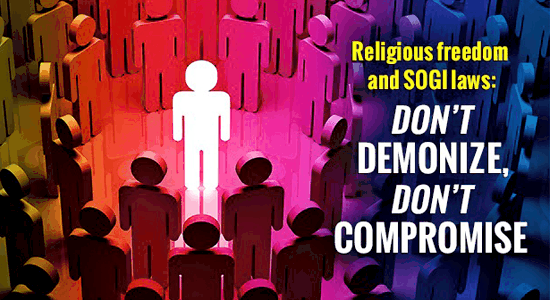Podcast: Play in new window | Download
Subscribe: RSS

When it comes to religious freedom, we face two equal and opposite temptations. But neither will do in the face of our current challenges.
Here on BreakPoint we often talk about the ongoing struggle between religious freedom and so-called “sexual freedom.” Today, religious freedom, though clearly established in the Bill of Rights, often loses. Sexual freedom is on the march and seems to be taking no prisoners.
The latest flash point in this struggle is so-called SOGI laws, that is, Sexual Orientation and Gender Identity laws. Essentially, SOGI laws create new protected classes of people based on inclination and behavior, not race, sex, or creed. As a result, anyone with religious convictions against participating or celebrating such identities is a bigot.
Here, as is the case with every other cultural challenge, Christians face two serious temptations: demonizing and compromising.
Our enemy is not those who support special gay or transgender rights. Our true enemy is the false ideas that hold them captive—a worldview that reduces human beings to the sum of their desires and behaviors; that promotes pleasure as the ultimate human good.
The other serious temptation, and the one I want to focus on today, is one to which many of our brethren have already succumbed: compromise.
Some within the evangelical Christian camp are now proposing that the best way forward is to actually accommodate SOGI laws, as long as they include limited religious exemptions. The idea is something like this: “We’ll recognize sexual orientation and gender identity as protected classes of human beings, as long as churches and certain religious organizations are exempt.”
There are three problems with this line of reasoning. First, Christians must be truth tellers, and Christians cannot endorse a falsehood, even if for self-protection. To say that sexual orientation or gender identity defines a different class of human beings is simply not true. Who we are as God’s image bearers is no small part of the Gospel story, and SOGI laws deny who we truly are as people.
Second, while these accommodations may protect houses of worship and some Christian institutions, they don’t protect all Christian institutions and certainly don’t protect all Christians, especially those in the public square or world of commerce—like the baker, photographer, or florist.
All callings are sacred for all Christians. To seek to protect churches or organizations for doing “ministry,” but not photographers, bakers, and other Christians is to misunderstand the holistic life we are called to live in Christ. It’s particularly strange, by the way, for some Christian liberal arts colleges to promote compromise with SOGI laws. Most would teach students the idea that all callings are sacred, but apparently they don’t believe the teaching applies once their students graduate.
Third, by establishing sexual orientation and gender identity as a protected class of people, we’re allowing ourselves to be placed automatically in the category of bigots. I get the impulse to draw the line where we can, but if we are bigots already, it’s unwise to think that line of compromise won’t move significantly in the future.
Today, I’ve joined with Alan Sears of the Alliance Defending Freedom and an amazing list of about 80 other Christian leaders to sign a statement clarifying where we stand on these troubling SOGI laws. The statement is very clear: SOGI laws threaten the freedoms of Americans to speak, teach, and live out their deeply held convictions in public life without fear of lawsuits or government coercion.
You can read the statement at ColsonCenter.org/freedom. In fact, you can add your name to the list of signers. And you’ll find resources on how to talk about religious freedom and SOGI laws with friends and neighbors.
Again, come to ColsonCenter.org/freedom.
And, visit Breakpoint.org to get further information about the many great books and other resources available there and you can link up to our social media sites like Facebook and Twitter.